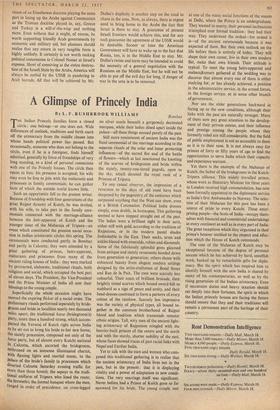Egypt in Gaza
THE various diplomatic manoeuvres which have been going on over the Gaza strip illustrate strikingly the advantages to be gained by a man who knows his own mind when dealing with people whose one common sentiment is a desire to avoid a row at all costs. Colonel Nasser's tactics have been excellent and his aim unswerving. By the familiar process of making demands which are always said to be the last, but never are, he has succeeded in asserting Egyptian sovereignty over the Gaza strip and has forced Mr. Dulles and the American Government into breaking the pledges which were given to the Israelis before 'their with- drawal behind the armistice line. The Egyptian interpretation of the function of UNEF has pre- vailed, and this capitulation will, no doubt, be completed during Mr. HammarskjOld's visit to Cairo. Meanwhile, Mr. Selwyn Lloyd has sud- denly revived Sir Anthony Eden's Guildhall idea of 'a compromise' on the frontiers of Israel—that is, a cession of territory by a State already smaller than Wales. Colonel Nasser may well feel pleased with himself, but what about those whom he has successfully blackmailed?
Of course, it is understandable that Mr. Ham- marskjold should wish to appease the Egyptians. Without Egyptian co-operation UNEF would collapse. It is very doubtful whether the forces under General Burns's command are sufficient to maintain order in the strip—apparently sentries are not even allowed to fire over the heads of people penetrating into their headquarters—and how they can hope to police a longish frontier remains a mystery. The collapse of the force, how- ever, would end all hope of an effective interven- tion of the UN in the Arab-Israeli dispute, and Mr. Hammarskjold, like many international officials, has something of a vested interest—from the very best motives—in his own organisation displaying as much zeal as possible.
Mr. Dulles, on the other hand, has now estab- lished a new speed record in the breaking of pledges—a distinction for which, one might have thought, he would have had some hesitation in competing. Again, his motives are quite clear. He is appeasing Colonel Nasser and bringing pressure on Israel to make concessions to Egypt purely be- cause he wants to line up the Arab world behind the Eisenhower doctrine. In other words, he is making precisely the same error the British - Government has made over the last ten years, and it may safely be predicted that it will lead him to the same place—Suez or Canossa. As for Mr. Sel- wyn Lloyd, it no longer matters very much what his motives were. Evidently British Middle Eastern policy is to die as it has lived. The Foreign Secretary is a peculiarly suitable choice for an undertaker, and his singing of the same tune to which the death agony was inaugurated at the Guildhall can probably be attributed to mere habit. At Bermuda it is the Americans who will have the say about the Middle East.
Under these circumstances the devious course of recent American policy is especially alarming. After breaking the assurances given on UNEF occupation of the Gaza strip, Mr. Dulles and his assistants are now contemplating putting more pressure on Israel to allow UN forces to be stationed on both sides of the armistice line—a proposal which, though innocent in appearance, would in fact have the effect of leaving Israeli settlements near the frontier defenceless in the face of fedayeen raids, since General Burns's force could hardly ensure their protection where their own forces had failed. That America should be pressing Israel to accept after what has happened is frankly outrageous. It suggests the treatment meted out to Czechoslovakia at the time of the implementation of the Munich agreement—a small power asked to make concessions to appease a belligerent neighbour in return for guarantees on the part of bigger powers which no one has any intention of fulfilling. For the UN to be associated with this procedure makes a mockery of its impartiality.
Fortunately, however, not all Americans are prepared to assist their policy-makers in brow- beating a small country, and both Republican and Democratic leaders in the Senate have shown that they have a better idea of the rewards to be expected from such a policy than the State Depart- ment or the President. The plain fact is that the vision of an Eisenhower doctrine playing the same part in lining up the Arabs against Communism as the Truman doctrine played in, say, Greece and Turkey is a will-o'-the-wisp and nothing more. Even without that it might, of course, be worth supporting friendly Arab governments by economic and military aid, but planners should realise that any return in very tangible form is highly unlikely. It certainly is not worth making political concessions to Colonel Nasser at Israel's expense. Short of conniving at the entire destruc- tion of the Israeli State by the Arabs, America will always be outbid by the USSR in .pandering to Arab hatreds. All that will be achieved by Mr. Dulles's duplicity is another step on the road to chaos in the area. Now, as always, there is urgent need to bring home to the Arabs the fact that Israel is there to stay. A guarantee of present Israeli frontiers would achieve this, and for any such guarantee the agreement of the USSR would be desirable. Sooner or later the American Government will have to wake up to the fact that Russia, too, is in the Middle East to stay. Mr. Dulles's twists and turns may be intended to avoid the necessity of a general negotiation with the Russians on the Middle East, but he will not be able to put off the evil day for long, if danger of war in the area is to be removed.



































 Previous page
Previous page